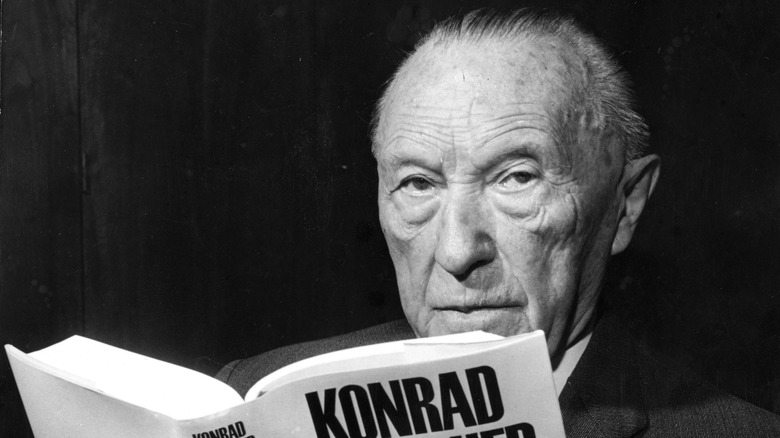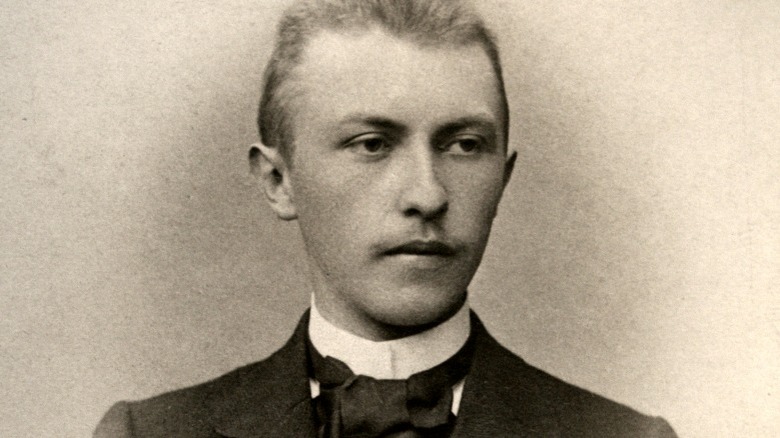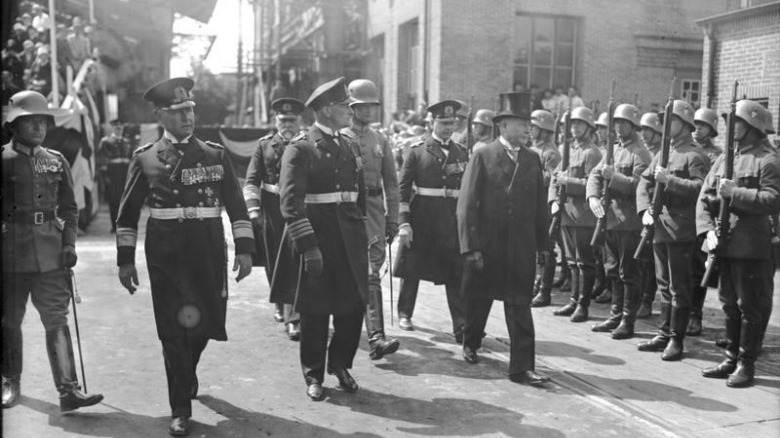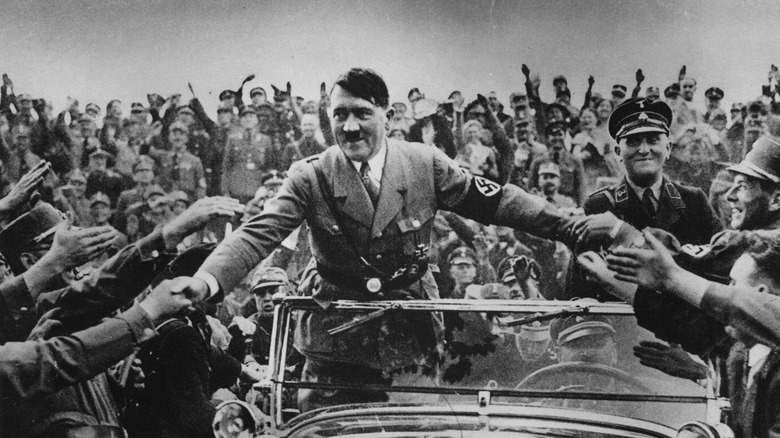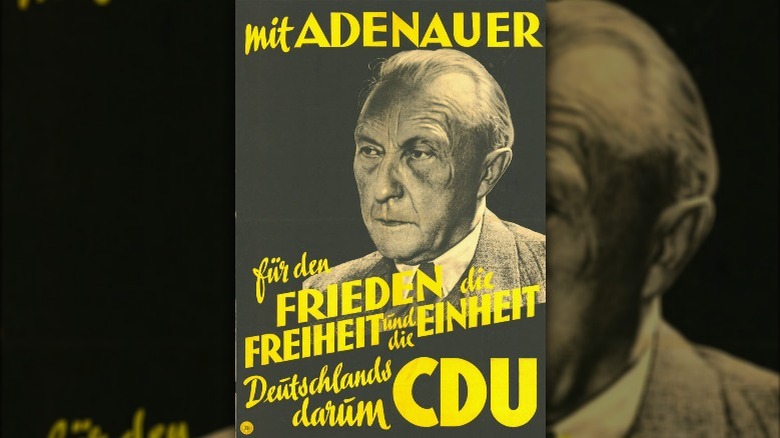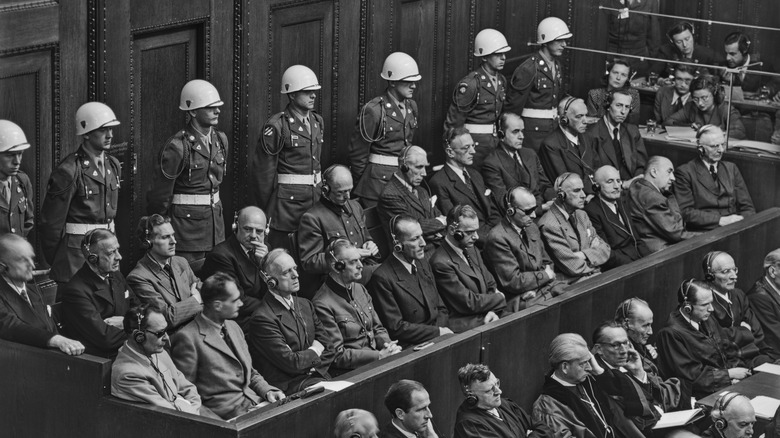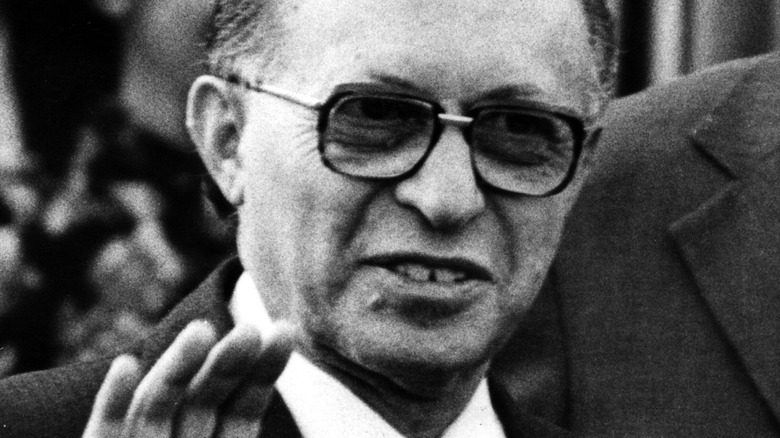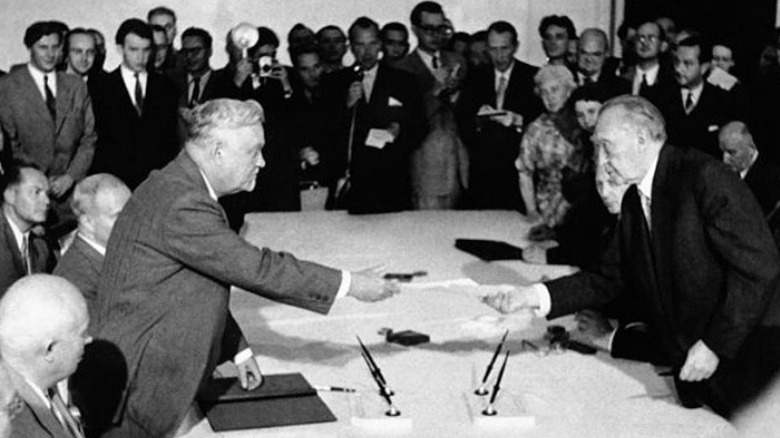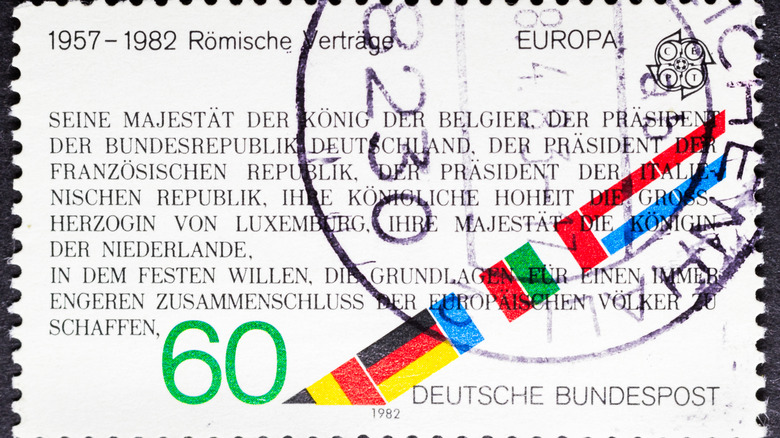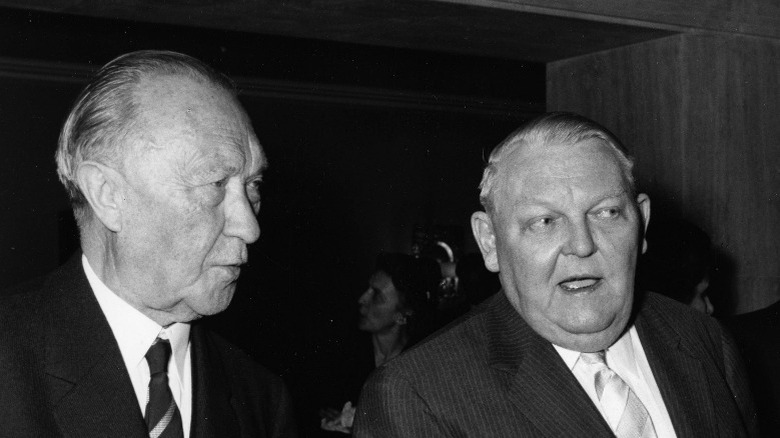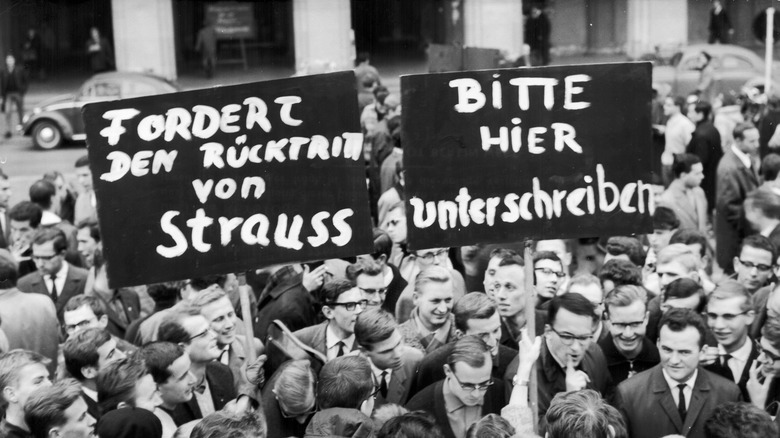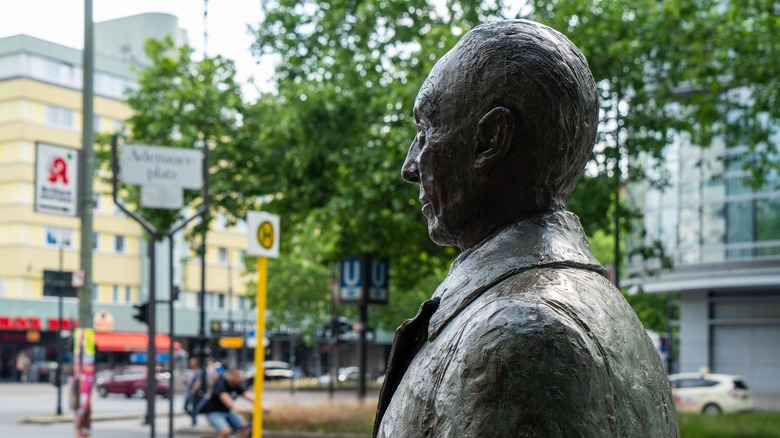The First Chancellor Of West Germany After The Defeat Of The Nazi Regime
Konrad Adenauer was born in 1876, lived through both World Wars, and remained a political titan into his 90s (via Konrad Adenauer Stiftung). Adenauer took on the mammoth task of rebuilding Germany after World War II — rehabilitating his country in the eyes of the world. Winston Churchill once called him the greatest German leader since Otto von Bismarck (via UPI/Madera Tribune).
Adenauer's early career took off long before the rise of the Nazis, and he was already a respected name in politics by the time he earned the ire of the Third Reich. After spending time behind bars during the war, he would return to politics at a time when Cold War tensions were deepening. Becoming the first chancellor of West Germany during the Allied occupation after WWII ended, he inaugurated a new democratic state and smartly tied himself as closely as possible to democratic Europe and the U.S. Perched perilously close to the ideological front lines of the Cold War in divided Berlin, the world looked to Adenauer with bated breath, as he held the fragile new West German state together.
The lifelong politician could not have wished for a more eventful life or career, and he ultimately achieved some stunning political successes. In a poll taken in 2003, he was voted the greatest German of all time (via the BBC). This is the story of Konrad Adenauer.
A tale of two Germanys
Konrad Adenauer was born into a fairly normal middle-class family in Cologne, Germany, and although he would later get into a great deal of trouble with the Nazis, Adenauer was never a political radical but rather a Catholic and a conservative (via the New European). Adenauer's totally ordinary origins are essential for understanding his later political career — a career that would change the face of Germany.
Long before the Iron curtain came clanking down across Europe, Germany was essentially divided into two — split between the Catholic West and the Protestant East — roughly along the River Elbe (via Unherd). West Germany shares a lot of its culture in common with the rest of Western Europe, having been part of both the Roman Empire and Charlemagne's Empire. The now-extinct state of Prussia in East Germany, on the other hand, was forged via iron and blood in the Middle Ages — the project of a group of Teutonic Knights determined to murder their Slavic neighbors (via History Today). Inevitably, the Prussians gained a reputation in Europe as a group of militaristic hotheads — a stereotype that isn't entirely unfair. Although many people tend to think of yodeling Munichites in lederhosen when they think of the Nazis, it was actually Prussians that voted for Hitler in large numbers.
Religion, culture, and ethnicity all exacerbated the divide between Germans East and West. Adenauer himself was resolutely West German and anti-Prussian in his outlook, and his heavily ingrained dislike of his Eastern neighbors would go on to shape his entire political career.
The World at War
After marrying into an upper-class family, Konrad Adenauer gained powerful connections that allowed him to move in influential circles (via Konrad Adenauer Stiftung). He was already heavily involved in local politics during the first decade of the 20th century, and he was put in charge of organizing the food supply in Cologne during the First World War.
Curiously, if Adenauer hadn't gone on to become chancellor of Germany you might know him today as an inventor of low-meat sausages — an early precursor to the soy-based vegetarian sausage people know and love today (via The Guardian). Food shortages caused by the war meant that Adenauer, then the deputy mayor of Cologne, had to be smart about feeding the people. He experimented with soy flour, using it as a meat substitute when supplies ran low. Concerned for the health of local Cologners, he also craftily snuck healthy vegetables into his "sausage" mix.
In what might be the most German origin story imaginable, Adenauer's sausage-making days earned him a great deal of respect and admiration. He was elected mayor of Cologne shortly afterward, in 1917, by a unanimous vote. As mayor, Adenauer proved to be a very talented administrator, and the parks and other municipal projects he crafted in Cologne were admired nationwide (via the New European). During the inter-war years, many people already believed he would one day become chancellor.
Adenauer snubs Hitler
Following the end of the First World War, Konrad Adenauer became very vocally anti-Prussian, blaming East Germany for the disaster that was the Great War (via the New European). Instead, he looked West, to France and the Low Countries, hoping for more inter-European cooperation. In the years leading up to World War II, Adenauer was no big critic of the Nazis — he was more worried about the communists and socialists he believed were a threat to the state (via Foreign Affairs). Nonetheless, his politics inevitably made him a marked man anyway.
Adenauer was in favor of allowing the disputed Rhineland region, coveted by both France and Germany, more autonomy (via the European Parliament). The Rhineland problem was a deeply controversial issue at the time, and many Germans — including the Nazis — viewed Adenauer as a back-stabbing turncoat, determined to sell out greater Germany. The final nail in the coffin came in 1933 when Adenauer refused to meet with Hitler or cover Cologne in Nazi banners (via the European Union). Hitler was not happy with the snub, and rumors circulated that Adenauer's life was in danger. Deciding to lay low, he took shelter in a Catholic monastery.
After he was removed from his office and had his bank account frozen by the Nazis, Adenauer decided to quietly retire. Nonetheless, he was arrested on two separate occasions by the totalitarian regime: once in 1934, and then again in 1944 for suspected involvement in a plot to assassinate Hitler (via the BBC).
Germany — and Adenauer — liberated
Konrad Adenauer's fortunes changed in 1945 when British and American tanks rolled into Germany. The Allies were looking for Germans they could trust while they worked out what to do with a bombed-out shell of a country. Initially, the Americans put Adenauer in charge of Cologne again, but after he publicly complained about the Allied occupation — the British fired him (via Konrad Adenauer Stiftung).
Despite the fact that Adenauer was now pretty old and had been warned to stay out of politics by the British, his career at the top was just about to start (via the New European). While Germany scrambled to reorganize itself, Adenauer joined the newly formed CDU (Angela Merkel's party for those who don't know), a moderate, Christian, conservative party with broad appeal. The Christian Democratic Union brought together various pro-democracy conservative groups across Germany in the late '40s (via the European Parliament).
As a member of the CDU, Adenauer was one of many politicians who sat on the council that decided on a new democratic constitution for Germany. After the constitution was inaugurated, Adenauer was elected Germany's first post-war chancellor, aged 73, in 1949. He won by just one vote.
The Denazification of Germany
The early period of Konrad Adenauer's chancellorship is, nowadays, extremely controversial. The Allies remained in Germany until 1952, and Adenauer was stuck with the difficult task of negotiating with the occupiers and redeeming various civil institutions which had previously been in Nazi hands (via BBC). Many Germans suffered from a great deal of anxiety at the end of the war, terrified that they would become the victims of sadistic reprisals (via the World War II Museum). Nonetheless, the "denazification" process that occurred turned out to be surprisingly lenient.
By 1946, the Germans themselves were put in charge of rooting out ex-Nazis. More than 13 million Germans were ordered to fill out a questionnaire about their past political activities, and all official Nazi party members were investigated. The sheer number of people involved in the Nazi regime presented a serious problem for Germany. Many people, including a lot of prominent churchmen, argued for forgiveness and pushed for a general amnesty.
As chancellor, Adenauer caved to political pressure and appeased those who wished to forget (via the New Republic). Pro-Amnesty legislation was passed that let hundreds of thousands of people off the hook. Speaking in the German parliament in 1951, Adenauer declared, "The chapter of collective guilt for militarists alongside activists and beneficiaries of the National Socialist regime must be ended, once and for all." In the years that followed, plenty of ex-Nazis went back to their normal lives and some even gained prominent government posts.
The 1952 assassination attempt
Unsurprisingly, ill-feeling toward Nazi Germany following the war put the chancellor at risk. In 1952, a terrorist group hid a bomb in an encyclopedia and sent it to Konrad Adenauer, hoping to blow him up (via The Guardian). The package ended up in the hands of a bomb disposal team, one of whom died attempting to disarm it.
Five Israeli Zionists were later arrested in France for their connection to the attack, and years later, one of the culprits implicated one of Israel's leading politicians — Menachem Begin (pictured). Begin was one of Israel's first prime ministers, and he even won the Noble Peace Prize for his role in the Camp David Accords (via DW).
Begin allegedly funded the bomb plot because he objected to Germany's reparation payments to Israel. As a form of apology for the Holocaust, Germany agreed to give money to the Israeli government — a deal Begin saw as too lenient. He and many others believed that Adenauer's government should have paid the families of the Holocaust victims instead.
Giving the Germans their guns back
One of Konrad Adenauer's first major achievements as chancellor was the rearming of the German state. The Americans, in particular, were deeply concerned about the sudden dramatic growth of the USSR, and by 1947 they were already taking steps to make West Germany a friend again (via Michigan State University). This put Adenauer in a great negotiating position for rearmament: He was able to argue that newly "cleansed" West Germany could be transformed into a powerful ally and a bulwark against communism.
The Soviets also extended an olive branch to Adenauer, hoping for cooperation over the now-divided Germany. However, Adenauer had no love for East Germany anyway and had always been a Western-leaning politician — a match made in heaven as far as U.S. politicians were concerned. East Germany was sacrificed without mercy, despite prevailing popular opinion in Germany favoring reunion over rearmament.
Although initially Germany had been banned from building up its military again, it was decided that it made more sense to allow Germany to rearm with NATO supervision. Germany was invited to join NATO in 1955, scaring the Soviets so much that they created the Warsaw Pact just one week later (via NATO). West Germany became the frontline of the Cold War in Europe, home to thousands of soldiers, supplied by both Germany and other NATO members. Adenauer's commitment to cooperation with the Western powers created some ironclad friendships in record time, dispelling much of the remaining enmity caused by the Second World War.
Spiritual Father of the European Union
In addition to his role in the early days of NATO, Konrad Adenauer is often considered one of the founding fathers of the European Union for his role in the creation of the European Coal and Steel Community. Adenauer, who had always been in favor of tighter bonds with France and the Low Countries, now found himself part of a generation of politicians determined to put bloodshed behind them and pull Europe closer together (via the New European). This ECSC economic agreement was, in essence, the EU's spiritual predecessor (via the European Parliament). It was believed that if Europe's economic interests were tied together, it would keep them from killing each other in the future — so far, so good for EU members.
The Union was announced at the so-called Schumman Declaration in 1950 and included France, the Low Countries, West Germany, and Italy (via the European Union). This momentous event was followed up by the Treaty of Rome in 1957, which created the European Economic Community, and the European Atomic Energy Community.
As a resolute Francophile, Adenauer became particularly cozy friends with French President Charles de Gaulle, another political giant of the time. Adenauer's warm relationship with de Gaulle allowed for the peaceful return of the disputed Saarland territory to West Germany, and France and Germany have remained close allies ever since.
A heart bypass for the heart of Europe
In addition to securing peaceful relations with the U.S. and Western Europe, Konrad Adenauer had one more miracle up his sleeve — the German economic miracle, to be precise. The ingenious chancellor cannot take total credit for Germany's remarkable economic recovery after World War II — the U.S. helped save the German economy with the 1948 Marshall Plan that pumped aid money back into Europe — but his policies were both intelligent and timely (via NATO).
Adenauer's economics minister, Ludwig Erhard (pictured right), was not actually in the CDU party, but Adenauer admired his talent and demanded he be given a post (via Konrad Adenauer Stiftung). In the late '40s, Erhard removed Nazi price controls and introduced a complex series of currency reforms that had a powerful and transformative effect (via Econlib). While in government Erhard became the chancellor's golden boy. Taxes and tariffs were lowered and liberal trade policies were encouraged to stimulate the economy (via The Atlantic). Erhard's policies paid dividends, and many well-known German companies, such as Volkswagen, roared back to life.
Adenauer's balanced approach embraced free-market principles but also checked the market with robust social welfare policies. His government built houses, and motorways and modernized agriculture. By 1955, the German economy was already booming.
A career-ending scandal
Unfortunately, all good things must come to an end, and eventually, Konrad Adenauer's glossy sheen wore off. Although Adenauer came to power for a fourth term in 1961, this time he had lost his parliamentary majority and had to form a coalition (via The Guardian). He had, in all likelihood, been in power too long — he was already known as the "old man" of politics when he won his first term back in 1949 (via NATO). A year after his final reelection, Adenauer's government was embroiled in a scandal that tarnished his reputation.
After Germany's Spiegel magazine printed a damning analysis of the German military, the publisher was investigated by the police for suspected espionage (via Spiegel International). The disastrous police operation that followed led to the arrest of a group of journalists, accused of leaking state secrets. The police also occupied the magazine's offices for a month in a ludicrous operation that led nowhere. The entire debacle was seen as an unjustified authoritarian crackdown on the free press, an act of revenge for causing the government serious embarrassment.
The widespread outcry that followed led to the resignation of Adenauer's defense minister. Adenauer himself stayed in power a little longer, but his days were numbered. After his own party called for him to resign, he finally stepped down for good in 1963 (via the European Parliament).
Death and legacy
After four incredible terms as chancellor, Konrad Adenauer finally faded into the background as CDU party chairman. As is often the case with very hard-working people, retirement finally killed him in 1967. One year after stepping down as chairman, he died, aged 91 (via Konrad Adenauer Stiftung).
While Adenauer was no angel, and he was often criticized while he was alive for his authoritarian political style, in the long run, his commitment to cooperation and democracy has ultimately made him a legend (via The Atlantic). His chancellorship helped transform Germany into a wealthy and powerful international player once again, when it might have otherwise crumbled into dust.
Konrad Adenauer's career is best summed up in his own words. Speaking to the French High Commissioner in 1954, he remarked, "Do not forget that I am the only chancellor Germany has ever had who preferred the unity of Europe to the unity of his country" (via NATO). In Germany today, his towering reputation as a modern politician has never yet been equaled.
